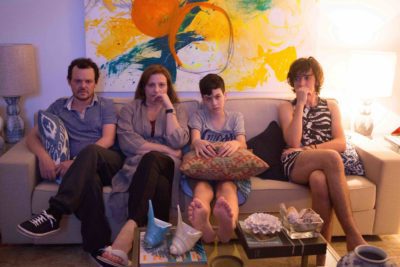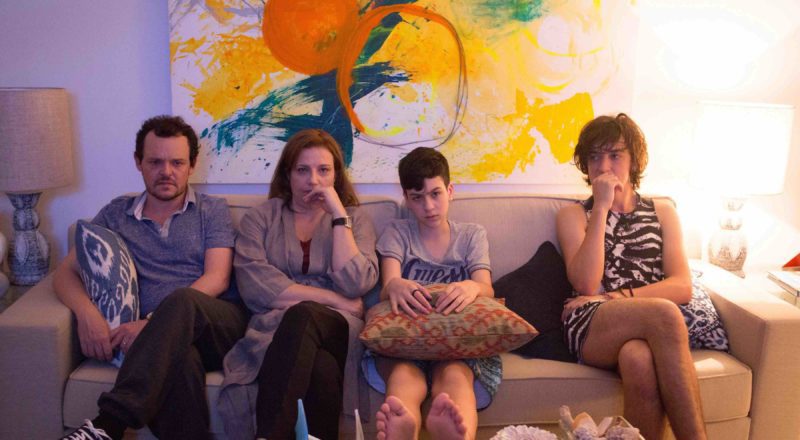INTERVIEW: Filmmaker Anna Muylaert explores identity issues in new drama, ‘Don’t Call Me Son’

Don’t Call Me Son, which is currently playing New York City’s Film Forum, is the latest drama from celebrated Brazilian filmmaker Anna Muylaert. The film, running a quick 82 minutes, follows Pierre (newcomer Naomi Nero), a teenager struggling with changing family dynamics and his own identity.
Nero’s character is a member of a rock band and is seemingly enjoying life with his mother (Dani Nefussi) and sister. As Pierre hangs out with friends and juggles life at school and with his family, he begins exploring his own sexuality and identity. The audience first sees the character in a romantic encounter at a party where Pierre wears eyeliner and black-lace underwear.
Pierre’s world is upturned when he finds out that his mother is not his biological mother. He, in fact, was stolen as an infant, and now he must reunite with his biological parents. They are played by Matheus Nachtergaele and Nefussi (with a different hair color and haircut). This second set of parents are not as accepting of Pierre’s choice to wear dresses, and his identity is challenged openly and makes for some tense scenes.
“I wanted to make a smaller film with a smaller budget with a younger crew and younger cast with no famous actors,” Muylaert said recently in a phone interview from Brazil. “I wanted to research the character of the son because I think that idea of changing everything, and your name is not your name, your house is not your house, and then, who are you if nothing you have for yourself is yours?”
Nero, who offers a powerful performance, auditioned for Muylaert approximately two months before shooting. “I had to do some tricks to make him have fear of losing the part,” Muylaert remembers. “He had this feminine and masculine feeling, presence and face, so he was the only one I could have chosen. But it was a lot of tests. I tested a lot of teenagers.”
The original title of the film in Portuguese is translated as There’s Only One Mother, and that speaks to the writer-director’s choice to have Nefussi play both of Pierre’s mothers. “In the symbolic level, I’ve always thought that was the same mother,” she said. “The first one being the mother of childhood, and then the kid grows up and becomes a teenager. The mother changes, and suddenly she doesn’t accept everything anymore. There are parts that she doesn’t accept, and the kid doesn’t feel so loved anymore. … But it’s strange because people said, ‘No, this is not a good idea. Everybody will be confused. Nobody will understand.’ But, no, she’s such a good actress that nobody even tells that she’s the same actress, so in the end, it’s just a little noise, not a big noise as it could have been.”
The audience reaction to the drama has been interesting for Muylaert, who also directed The Second Mother a couple of years ago. She said that teenagers often cry when watching the movie because they identify with the character of Pierre.
“Some of them come to me crying, saying, ‘This is the film of my life,'” she said. “We did some screenings for mothers, and they really loved it too because they are living the same situation on the other side. But in general for adults, I think teenagers love the film much more.”
In the process of bringing Pierre’s character to the screen, Muylaert considered the structure of the story during the writing process and then trusted her actors to be “co-authors” on the project.
“The dialogue and the shape of the characters, I always finish that with the actors and on the set because sometimes even on the set things change,” she said. “And as a director, I’m very open. I like things to change. I like things to be alive. I like actors to bring things and feelings. I consider actors co-authors. I always say … ‘I’m not going to tell you what to do. Please, what do you feel? What do I feel?’ And then we do something together.”
She added: “The Second Mother, for sure, was very different because in Brazil it was like a disease. People really felt it and had to recede their behaviors at home because everything that happened in the film was so real that people really [were] like seeing themselves in a mirror. The film was really huge here, and of course in the [United] States, it was good. The reviews were good, but it was something that was happening somewhere else. But this film is more universal I think. It could have happened anywhere. … It’s much more a psychological film. I think it’s much more about acceptance, about expectations and being yourself.”
By John Soltes / Publisher / John@HollywoodSoapbox.com
Click here for more information on Don’t Call Me Son at Film Forum in New York City.

